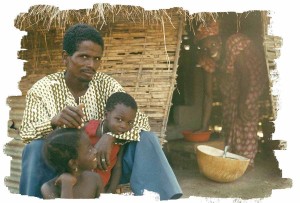From: Tubob:Two Years in West Africa with the Peace Corps
A group of young people from the philanthropic group Crossroads Africa arrived in The Gambia, West Africa. Volunteers pay a sum of money to make a six-week trip like this. Their first destination had been Nigeria, but at the last minute they were denied visas, so the group came to The Gambia. It fell on USAID to design a worthwhile program for the fifty-eight volunteers, ten of whom would be assigned to our upriver village, Basse.
An officer with the Expanded Program of Immunization of The Gambia stopped by on Tuesday and asked me if I would go with the group to the large Serahule village of Garawol on Wednesday to help them with immunizations. I accepted, pleased to be asked.
Working with the Crossroads peope at Garawol was an interesting experience for me. As usual, we first called on the Alkala, the village chief, and then proceeded to immunize the children against polio.
The following Thursday I had a chance to again work with the Crossroads people, this time on a Nutrition Survey. They conducted what they called a “random survey.” It gave me a new understanding of “random.” If I were to pick apples randomly, I would select one here, one there. But the scientific term, in this case, meant to begin with a selected village, then, as protocol demands, go to the Alkala’s compound, explaining our mission to him. We began with his children by weighing, measuring for height, and measuring the upper arm, a good measuring place to detect malnourishment.
Next came the random part. The group leader took out a one-dalasi bill and read the last serial number. If the number was between one and four, it was used as the basis; if not, one worked backwards until a number between one and four was found. Then, facing east toward Mecca and working clockwise, number one was east, number two south, number three west, number four north. After leaving the Alkala’s compound, the group followed the number going the direction as dictated by the number on the dalasi. Then, the next number on the dalasi determines where you stop. If it was a three, the group stopped at the third compound and took the measurements of the children there. We continued to follow this formula, eventually getting the measurements of thirty children. The word “random” will forever have that memory for me.
The reason for the random survey is that it’s so easy to be swayed. People see malnourished children and take their measurements to confirm their suspicions, or see healthy children and want to “reward” the parents by measuring those children. The random survey produces a fair sampling without local influences.
I found the Crossroads Africa workers a nice group of young people, hard working and goal oriented. They performed a worthwhile service to their host country.


